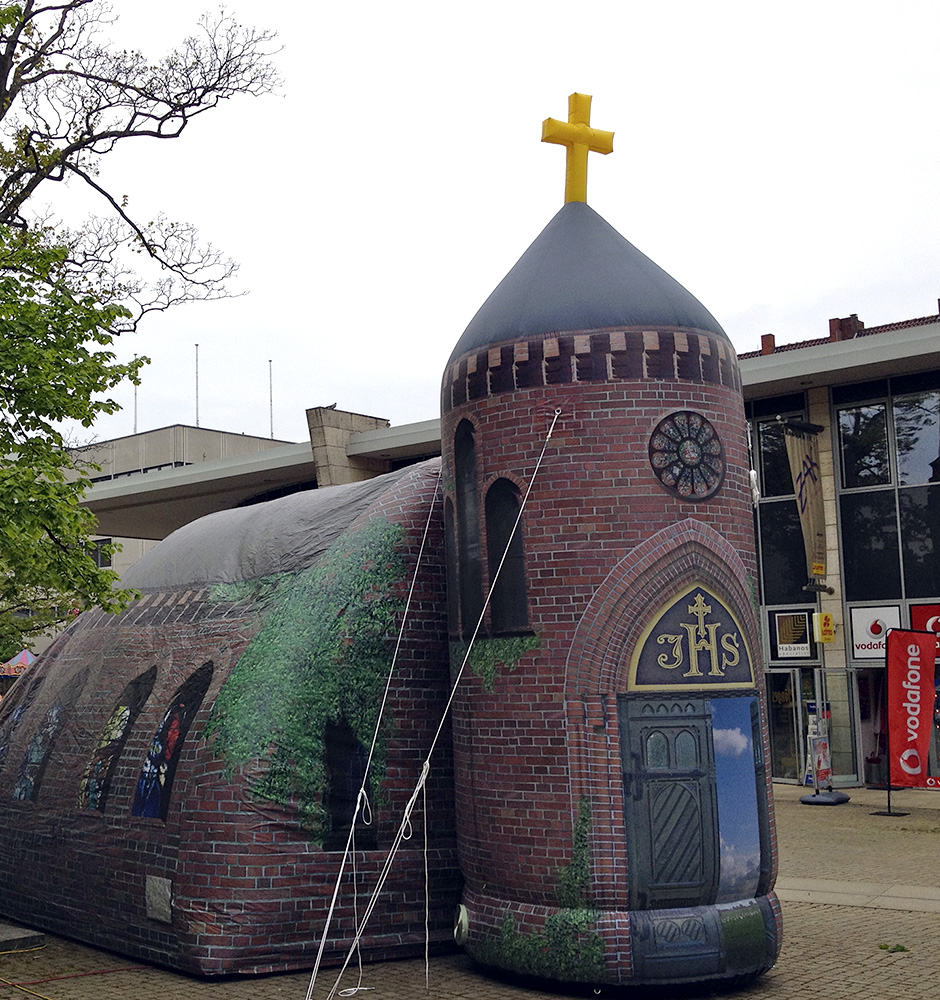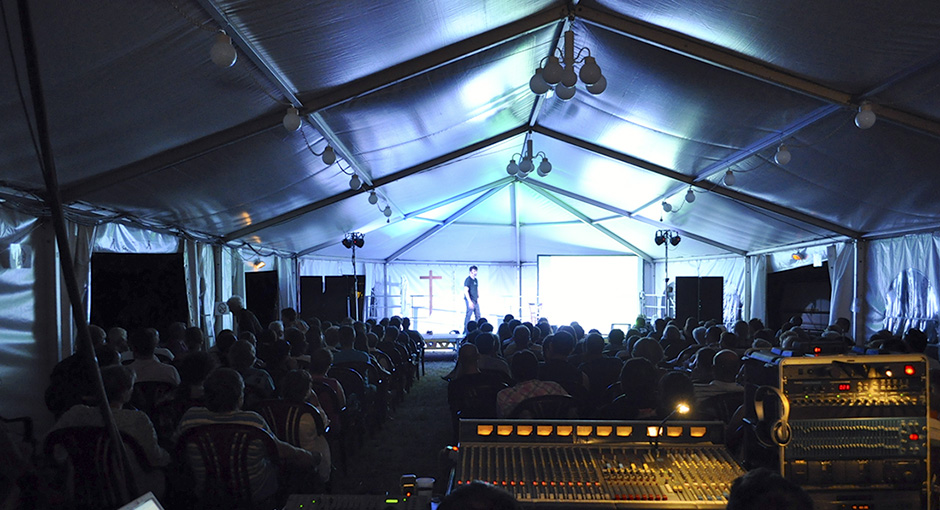


The inflatable church draws in curious visitors of all types – even secular Europeans who’ve never set foot in a church.
COURTESY BARRY SLOAN

The inflatable church draws in curious visitors of all types – even secular Europeans who’ve never set foot in a church.
COURTESY BARRY SLOAN

The Germany Conference’s tent ministry stays on the road during the busy European summer-festival season.
COURTESY BARRY SLOAN

The Germany Conference’s tent ministry stays on the road during the busy European summer-festival season.
COURTESY BARRY SLOAN
During challenging times, many pastors may describe being in ministry as “deflating.” For the evangelism staff in the Germany Conference, “deflating” is part of the job description. Of course, most pastors don’t require an air compressor to ready their sanctuary for worship.
An inflatable pop-up church is a key part of the conference’s evangelism effort, which also includes a fleet of tents to erect at summer festivals.
“When I heard we were getting the inflatable church, I thought it’s a gimmick, but to be honest, it’s proved to be a really interesting and fruitful tool for outreach ministry,” says the Rev. Barry Sloan, director of evangelism for The United Methodist Church in Germany.
Sloan’s main job is helping churches to understand and reclaim the practice of evangelism, which is more of a challenge than one would think.
“There are many churches where evangelism is still a blue word; there’s still kind of a hang-up with it,” he says. “Maybe it’s been abused in the past. This term or the models that we’ve used may scare people, playing with emotions. Everything that the church should be about is the gospel, which is evangelism. So it’s good news we’ve often made into bad news.”
To overcome congregations’ hesitancy to evangelize, the German church has embraced unique methods of bringing the gospel to people.
To readers in the United States, the term “tent ministry” may conjure up images of old-time revivals with fried chicken buckets for offering plates, but think again. These tents have wooden floors, stage lighting and state-of-the-art sound systems. The Germany Conference has 11 tents that seat up to 600 people each, and they stay on the road during the busy European summer-festival season. They also have heating systems that allow year-round use.
They also have a mobile street café — a fully fitted tour bus that turns into a street café with seats and tables and a classroom upstairs with creative activities for kids — as well as a trailer truck that opens into a covered stage for outdoor events, a portable climbing wall and other outdoor games.
Then there is the inflatable church, which looks like a cross between an orthodox cathedral and a bounce house.
“People see it, and they smile; then they get curious, so they come to the door,” Sloan says.
Inside, there is an altar as well as prayer stations with art supplies set up for visitors.
“They’re all toys, resources that we would offer to congregations to help them go out into the communities and share the gospel of God’s love,” he adds.
Sloan points out that because so many European countries are secular, many of the visitors have never been in a church. Yet, many become still and quiet upon entering, even allowing staff to bless them and pray for them.
Never-changing gospel, ever-changing world
Doing ministry in places where people know literally nothing about the gospel can be a bit of a culture shock.
Sloan, originally from Ireland, was appointed to a church in post-Communist East Germany. He tells a story about one service where a girl came in off the street and sat in the front pew. At the front was a mural of Jesus wearing a crown of thorns and carrying a cross. The girl turned to the person next to her and asked, “Who’s that? Why is he wearing that?”
Sloan says one of the challenges he has enjoyed in his ministry setting is finding ways of connecting with people who don’t have the first inkling about church.
“That really makes you think about what you believe, how that impacts your life and how do you transmit that to others?”
While it is unusual to try to connect with people who may literally not know Jesus, Sloan considers it healthy — and necessary — for anyone in ministry to be innovative in their approach.
“The challenge of every generation is getting across the never-changing message of the gospel in an ever-changing world. How we package it and how we present it and how we deliver it ... varies from location to location, from country to country, from time to time, depending on just the context.”
Sloan is part of Fresh Expressions ministry, a United Kingdom-based movement that encourages churches to try different approaches to reach the unchurched, including reaching beyond church walls to forge relationships with the community. It’s much like The United Methodist Church’s Rethink Church campaign, but originates in the Church of England and is used by many British Methodist churches.
“Our motto is ‘think outside the box,’ and in our context, the church is the box,” Sloan says. “We have things like whiskey tasting. We will have a café for immigrants; people (have) fled from Syria or Iraq and they’ve suffered amazing things to get to Europe. We’re in a neighborhood there that’s 90 percent atheists.”
The goal, as with Rethink Church, is to create community. The congregation connects with others, and the end goal may not necessarily be to get that person to “join the flock.” It may be simply to forge a relationship and to serve another person.
“You may end up painting a fence with three guys that never go to church. (You) become aware that that’s community, and that’s an important step,” Sloan says. “I often challenge congregations where I speak to ask, ‘How is the community better off that we’re in it?’”
Sloan acknowledges it is difficult to ignore the reports of declining membership and churches closing and surveys highlighting religion’s diminishing influence in society. But he also wonders if it’s an opportunity to re-evaluate United Methodism’s approach to ministry.
“Are we really prepared to die? What seeds are we prepared to let fall into the ground and die so that new life can grow? We only have the Gospel to offer and Christ to offer. All our programs and everything is all about that good news that God is reaching out his hand to you and saying, ‘Hey, let’s do life together.’”
Joey Butler is multimedia content editor at United Methodist Communications, Nashville, Tennessee.